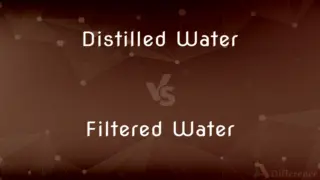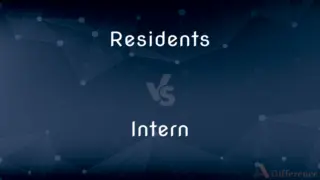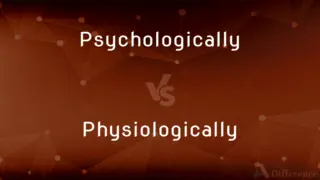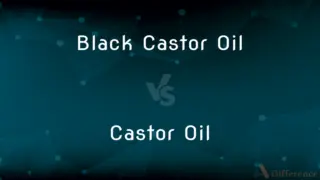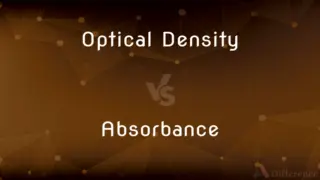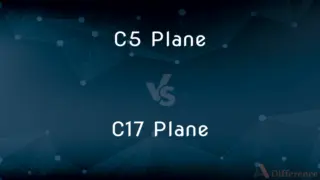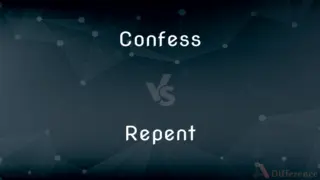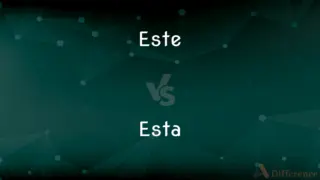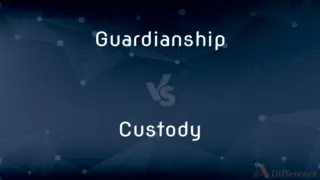Warlock vs. Wizard — What's the Difference?
By Maham Liaqat & Urooj Arif — Updated on March 24, 2024
A warlock is often portrayed as a male witch or someone making pacts with otherworldly beings, while a wizard is typically seen as a wise and powerful magic user, mastering spells through study.

Difference Between Warlock and Wizard
Table of Contents
ADVERTISEMENT
Key Differences
Warlocks are frequently depicted in folklore and fantasy as individuals who gain their powers through bargains with supernatural entities, focusing on the darker aspects of magic. Whereas, wizards are generally portrayed as practitioners of magic who acquire their abilities through rigorous study and the mastery of arcane knowledge, often serving as scholars or advisors.
Warlocks may be seen as outsiders or rebels within magical communities, their powers derived from sources considered forbidden or dangerous. On the other hand, wizards often hold positions of esteem or authority, their knowledge and control over magic making them respected figures in societies that value their wisdom and power.
The term "warlock" can carry connotations of betrayal or malevolence, hinting at a break from traditional or ethical magical practices. Conversely, the image of a wizard is usually more benign, associated with benevolence, guidance, and the pursuit of knowledge for the greater good.
Warlocks sometimes are portrayed as having a more personal, individualistic approach to magic, with their powers reflecting their unique pacts and relationships with otherworldly beings. Wizards, in contrast, might adhere to more universal principles of magic, their spells and abilities part of a wider, shared magical tradition.
The depiction of warlocks often emphasizes themes of ambition, desire for power, and the willingness to cross moral boundaries. Whereas wizards are frequently shown as embodying wisdom, restraint, and a deep responsibility towards the use of their magic.
ADVERTISEMENT
Comparison Chart
Source of Power
Bargains with supernatural entities
Study and knowledge of arcane lore
Role in Society
Outsiders, rebels, or antagonists
Scholars, advisors, or revered figures
Connotations
Betrayal, malevolence, ambition
Wisdom, guidance, benevolence
Approach to Magic
Personal and individualistic
Universal and scholarly
Typical Depiction
Darker, more dangerous magic
Benevolent, controlled use of magic
Compare with Definitions
Warlock
A person who practices witchcraft.
The village feared the warlock living in the forest for his reputed dealings with demons.
Wizard
A character in fantasy settings known for their magical prowess.
My wizard character can cast powerful spells to control the elements.
Warlock
Someone bound by a pact with a supernatural entity.
The warlock gained his powers after making a dark bargain.
Wizard
A scholar of arcane knowledge.
As a wizard, his study was filled with ancient tomes and magical artifacts.
Warlock
A character in games and literature with dark or chaotic magical abilities.
In the game, my warlock character specializes in curse magic.
Wizard
A figure of wisdom and guidance in folklore.
The old wizard guided the heroes on their quest with sage advice.
Warlock
A male witch or sorcerer.
Legends speak of a warlock who could summon storms with a whisper.
Wizard
A practitioner of magic, often depicted as wise and powerful.
The wizard advised the king on matters both mundane and mystical.
Warlock
A practitioner of magic considered unorthodox or forbidden.
He was branded a warlock for delving into forbidden spells.
Wizard
A magic user mastering spells through study.
The young apprentice aspired to be a wizard, dedicating his life to the study of magic.
Warlock
A warlock is a male practitioner of witchcraft.
Wizard
(in legends and fairy tales) a man who has magical powers.
Warlock
A person, especially a man, claiming or popularly believed to practice sorcery or witchcraft.
Wizard
A help feature of a software package that automates complex tasks by asking the user a series of easy-to-answer questions.
Warlock
A male magic-user; a male witch.
Wizard
Wonderful; excellent
How absolutely wizard!
I've just had a wizard idea
Warlock
A male witch; a wizard; a sprite; an imp.
It was Eyvind Kallda's crewOf warlocks blue,With their caps of darkness hooded!
Wizard
One who practices magic; a sorcerer or magician.
Warlock
Of or pertaining to a warlock or warlock; impish.
Thou shalt win the warlock fight.
Wizard
A skilled or clever person
A wizard at math.
Warlock
A male witch or demon
Wizard
(Archaic) A sage.
Wizard
Chiefly British Slang Excellent.
Wizard
(Archaic) Of or relating to wizards or wizardry.
Wizard
Someone, usually male, who uses (or has skill with) magic, mystic items, and magical and mystical practices.
You're a wizard, Harry
Wizard
One who is especially skilled or unusually talented in a particular field.
He was a financial wizard, capable of predicting the movements of the stock markets.
Wizard
(computing) A computer program or script used to simplify complex operations, often for an inexperienced user.
Use the "Add Network Connection" wizard to connect to a network in a series of simple steps.
Wizard
(Internet) One of the administrators of a multi-user dungeon.
Wizard
(obsolete) A wise man; a sage.
Wizard
(internet slang) A virgin over the age of 30.
Wizard
Fine, superb (originally RAF slang).
Wizard
(intransitive) To practice wizardry.
Wizard
(transitive) To conjure.
Wizard
A wise man; a sage.
See how from far upon the eastern roadThe star-led wizards [Magi] haste with odors sweet!
Wizard
One devoted to the black art; a magician; a conjurer; a sorcerer; an enchanter.
The wily wizard must be caught.
Wizard
Enchanting; charming.
Wizard
Haunted by wizards.
Where Deva spreads her wizard stream.
Wizard
Someone who is dazzlingly skilled in any field
Wizard
One who practices magic or sorcery
Wizard
Possessing or using or characteristic of or appropriate to supernatural powers;
Charming incantations
Magic signs that protect against adverse influence
A magical spell
'tis now the very witching time of night
Wizard wands
Wizardly powers
Common Curiosities
How does a wizard acquire their powers?
Wizards acquire their powers through the study of magic, learning and mastering spells from ancient texts and arcane knowledge.
Are warlocks always depicted as evil?
While warlocks often have darker connotations, they are not always depicted as evil; some narratives present them as complex characters with their own moral codes.
Can a warlock also be considered a wizard?
The terms can sometimes overlap in popular culture, but traditionally, a warlock's source of power (pacts with entities) distinguishes them from wizards (study).
Can anyone become a wizard?
In most fantasy narratives, becoming a wizard requires a specific aptitude for magic as well as years of study and dedication.
Are warlocks' powers inherently dark or evil?
The nature of a warlock's powers depends on their source and how they are used, though they are often associated with darker aspects of magic.
What defines a warlock in fantasy?
A warlock is typically defined by their practice of magic derived from pacts with supernatural beings, often with a focus on darker or forbidden magic.
Is there a gender distinction between warlocks and wizards?
Historically, "warlock" often referred to male practitioners, but in modern fantasy, the terms are generally not gender-specific.
What role do wizards play in magical societies?
Wizards often play roles as scholars, advisors, or leaders, respected for their knowledge and magical abilities.
Do warlocks and wizards exist in all fantasy settings?
The presence and depiction of warlocks and wizards vary by fantasy setting, with each universe having its own rules and lore surrounding magic.
What is the most significant difference between a warlock and a wizard?
The most significant difference lies in the source of their powers: warlocks from pacts with entities, and wizards from scholarly study.
How are warlocks and wizards depicted in popular culture?
They are popular figures in fantasy literature, movies, and games, with warlocks often seen as more renegade and wizards as wise and powerful.
What lessons can be learned from stories about warlocks and wizards?
Stories about warlocks and wizards can explore themes of power, responsibility, the pursuit of knowledge, and the moral complexities of using magic.
Can wizards make pacts like warlocks?
While wizards typically gain power through study, some narratives may feature wizards making pacts, though this blurs traditional distinctions.
What is the social perception of warlocks in fantasy worlds?
Warlocks are often viewed with suspicion or fear due to their unconventional sources of power and the moral ambiguity of their actions.
Why do some people prefer warlocks over wizards in stories?
Some may prefer warlocks for their complex moral dilemmas and the personal nature of their magic, which can lead to more nuanced storytelling.
Share Your Discovery

Previous Comparison
Prevalent vs. Relevant
Next Comparison
Contentious vs. PolemicalAuthor Spotlight
Written by
Maham LiaqatCo-written by
Urooj ArifUrooj is a skilled content writer at Ask Difference, known for her exceptional ability to simplify complex topics into engaging and informative content. With a passion for research and a flair for clear, concise writing, she consistently delivers articles that resonate with our diverse audience.














